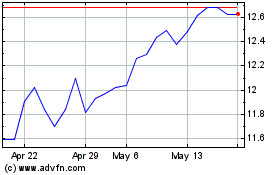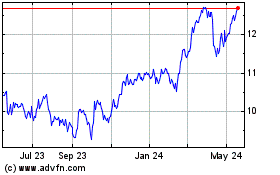U.K. Real-Estate Funds Reopen After Brexit Shut Down
13 September 2016 - 12:00AM
Dow Jones News
Some U.K. real-estate funds have started thawing out after the
post-Brexit freeze.
Asset manager Columbia Threadneedle Investments on Monday said
its U.K. property fund would reopen later this month. The
London-based firm had shut down trading in early July when
investors were rushing to pull their money out after Britain voted
to leave the European Union.
Earlier this month, asset management firm Canada Life lifted the
suspension of redemptions on its U.K. real-estate fund. And U.K.
fund manager Aberdeen Asset Management PLC reopened its property
fund in mid-July, having taken a slightly different approach after
Brexit, suspending its fund for a short time and charging a steep
fee if an investor still insisted on pulling money out.
Some of the biggest U.K. property funds remain shut, including
those at Standard Life Investments Ltd., Aviva Investors and
M&G Investments. In August, Aviva told investors it wouldn't
reopen its fund for at least another six months.
But the reopening of even a few funds signals that investors'
concerns about the impact on U.K. property market have eased since
the EU referendum in late June, when the property market was hit
hard. In addition to funds suspending trade, shares of listed
landlords sank, deals collapsed, and completed sales were done at a
discount.
So far, the market has held up better than some property experts
had expected. The discounts on sales haven't been as big as they
were in previous market downturns. Shares have rebounded.
The stability has been reason enough for some asset managers to
resume business.
"Any effects of the Brexit vote on the overall U.K. economy,
negative or otherwise, will take many months if not years to
transpire, and sometime after that for the property market," said
Don Jordison, managing director of property at Columbia
Threadneedle Investments, in a prepared statement.
Open-ended funds have been popular with investors because they
offer real-estate returns without the volatility that comes with
owning the shares of listed real-estate companies. A fund's price
is based on monthly appraisals of the property owned by the
fund.
Yet these funds often face criticism over their structure: they
promise investors the ability to withdraw their money daily even
though property assets like office buildings or shopping malls can
take months to sell.
This has proved problematic in times of market stress. After
Brexit, asset managers decided to freeze their property funds to
sell property.
Aberdeen reopened after setting up new procedures for pricing
redeemed units. If investors wanted to take money out, they needed
to pay a 17% fee. During that period, the firm sold properties,
often at steep discounts, to fund redemptions.
The exit fee at Aberdeen has since been reduced to 5%. Columbia
Threadneedle sold, or agreed to sell, 25 properties for £ 167
million ($221.5 million) since July, it said. On average, the sale
prices were 1% less than the valuation before Brexit.
At the time of the suspension, Columbia Threadneedle's fund had
been worth £ 1.3 billion. The property fund will reopen for trading
on Sept. 26 without redemption penalties, it said.
Elizabeth Pfeuti also contributed to this article
Write to Art Patnaude at art.patnaude@wsj.com
(END) Dow Jones Newswires
September 12, 2016 09:45 ET (13:45 GMT)
Copyright (c) 2016 Dow Jones & Company, Inc.
Aviva (PK) (USOTC:AVVIY)
Historical Stock Chart
From Dec 2024 to Jan 2025

Aviva (PK) (USOTC:AVVIY)
Historical Stock Chart
From Jan 2024 to Jan 2025
